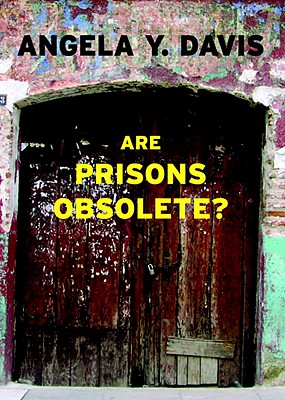Are Prisons Obsolete? (Open Media Series) (Paperback)

$15.95
On Our Shelves Now
Staff Reviews
Short, simple, and just repetitive enough, this primer on prison abolition covers all the basics but never makes you feel talked down to. The prose is patient and kind and meets you where you are (especially if where you are is at the beginning). It might not convert your conservative uncle...but that's where you come in.
— BekahDescription
With her characteristic brilliance, grace and radical audacity, Angela Y. Davis has put the case for the latest abolition movement in American life: the abolition of the prison. As she quite correctly notes, American life is replete with abolition movements, and when they were engaged in these struggles, their chances of success seemed almost unthinkable. For generations of Americans, the abolition of slavery was sheerest illusion. Similarly,the entrenched system of racial segregation seemed to last forever, and generations lived in the midst of the practice, with few predicting its passage from custom. The brutal, exploitative (dare one say lucrative?) convict-lease system that succeeded formal slavery reaped millions to southern jurisdictions (and untold miseries for tens of thousands of men, and women). Few predicted its passing from the American penal landscape. Davis expertly argues how social movements transformed these social, political and cultural institutions, and made such practices untenable.
In Are Prisons Obsolete?, Professor Davis seeks to illustrate that the time for the prison is approaching an end. She argues forthrightly for "decarceration", and argues for the transformation of the society as a whole.
About the Author
Over the last forty-odd years, ANGELA YVONNE DAVIS has been active in numerous organizations challenging prison-related repression. Born in Birmingham, Alabama in 1944, Davis studied at Brandeis University, the Sorbonne, and with Herbert Marcuse at the Goethe Institute. Her advocacy on behalf of political prisoners, and her alleged connection to the Marin County courthouse incident, led to three capital charges, sixteen months in jail awaiting trial, and a highly publicized acquittal in 1972. In 1998, Davis was one of the twenty-five organizers of the historic Berkeley, California conference “Critical Resistance: Beyond the Prison Industrial Complex.” She is the author of many books, including Are Prisons Obsolete? and The Meaning of Freedom. She currently teaches in the History of Consciousness Department at the University of California, Santa Cruz.
Praise For…
“In this extraordinary book, Angela Davis challenges us to confront the human rights catastrophe in our jails and prisons. As she so convincingly argues, the contemporary U.S. practice of super-incarceration is closer to new age slavery than to any recognizable system of 'criminal justice.” —Mike Davis, author of Dead Cities and City of Quartz
“In this brilliant, thoroughly researched book, Angela Davis swings a wrecking ball into the racist and sexist underpinnings of the American prison system. Her arguments are well wrought and restrained, leveling an unflinching critique of how and why more than 2 million Americans are presently behind bars, and the corporations who profit from their suffering.” —Rep. Cynthia McKinney [D-Georgia]
"As Angela Y. Davis has written, “prisons do not disappear problems, they disappear human beings.” Prisons do not contain a “criminal population” running rampant but rather a population that society has repeatedly failed. Uprisings in response to the hellish conditions Black folk have been forced to live in, both in and out of prison, have been criminalized as well. In her book Are Prisons Obsolete?, Davis effectively analyzes the purpose of prisons. “These prisons represent the application of sophisticated, modern technology dedicated entirely to the task of social control,” she writes, “and they isolate, regulate, and surveil more effectively than anything that has preceded them.” An institution based on social control instead of social well-being is an institution that needs to be abolished." —Colin Kaepernick, from Abolition for the People: The Movement for a Future Without Police & Prisons

